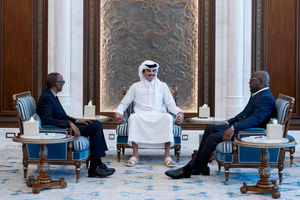Government to research blockchain tech

The deputy permanent secretary in the ministry of Works, Transport and Communication responsible for Communications, Dr Jim Yonazi.
What you need to know:
- Blockchain technology is well practiced worldwide but it has not been well tested in Tanzania. Though ICT professionals see it as potential for advancing the digital economy agenda in the country, the government says it needs more time and research before adopting it.
Dar es Salaam. The government says it will conduct a thorough research into what the blockchain technology entails before making a decision on the role that the system has in advancing Tanzania’s digital economy agenda.
Blockchain is a data structure that can store transactions or events that have been executed among participating parties.
It is an append-only transaction ledger that can be written onto with new information, but whose previous information, stored in blocks, cannot be edited, adjusted or changed.
Speaking during the second annual conference of ICT professionals, the deputy permanent secretary in the ministry of Works, Transport and Communication responsible for Communications, Dr Jim Yonazi, said the technology was still new to people, calling on the government to conduct research before making any decision.
“Although we (government) can have a national blockchain committee, I also challenge you (experts) and universities to conduct thorough research on this technology to understand its potentials and challenges before full adoption,” he urged.
He expressed belief that research would pave the way for the formation of favourable policies, laws and regulations that would make sure the technology was not a threat to people and the government.
His worries also came from discussions during the conference where experts said since the platform had no boundaries, blockchain could take some powers from the Central Bank in regulating the financial and economic sectors.
According to Mr Anthony Kigombola, who teaches ICT at the University of Dar es Salaam, Blockchain technology offers at least nine potential benefits to Tanzania and other African countries.
He said the syatem can specifically be beneficial in areas of natural resources, land administration, documents/certificates authenticity, e-commerce, entertainment and media, fighting counterfeit products, agriculture supply chain, fighting corruption and in voting.
“The Tanzanian digital ecosystem is still at its infancy and most of its economic activities are still informal…Formalization of the activities needs such digital products as business software, communication platforms, affordable financial services, affordable logistics and market places which are easily accessible in the Blockchain platforms,” he added.
In his view, despite the fact that the country is rich of minerals but the supply chain for extraction still face some challenges that make Tanzania not to benefit from the resources.
Same challenges go to land administration, referring to the existing land disputes due to inconsistent and fraudulent processing of land-ownership.
With reference from Rwanda and Ghana Mr Kigombola said land records can be housed in an immutable Blockchain, making sure that the records are intact and the title deeds match government records.
Mr Kigombola was also positive that, Blockchain technology can resolve challenges of fake certificates, counterfeit goods and cheatings during voting.
“Blockchain data is noticeable to everyone in the system. It is easy to see the documents but you cannot edit them,” he noted.
According to him, through the data, no one can change the results of anything.




